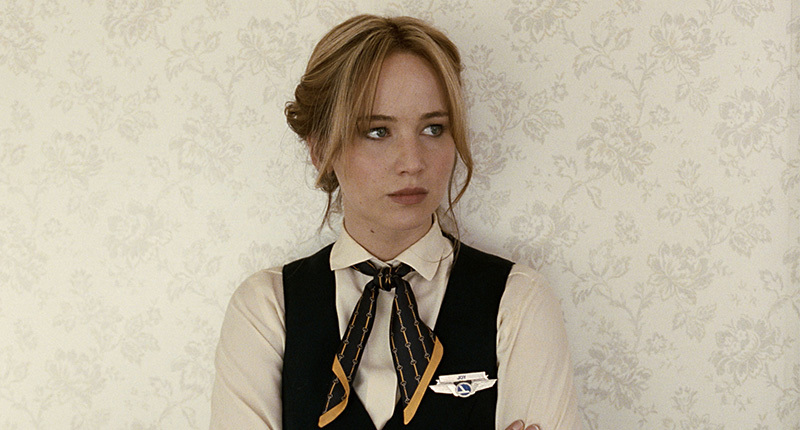
Soap operas play a rather large role in David O. Russell’s Joy. Joy’s mother (Virginia Madsen), who is depressed, spends most of her days in bed watching soaps and we are treated to snippets of what she sees on the screen. For authenticity’s sake—or as an inside joke, perhaps—the soap actors are played by real soap stars like Susan Lucci and Maurice Benard. Except for one thing: The acting on these imaginary soaps is absurdly stilted and horrible. The actors take overly long dramatic pauses, stare blankly at off-screen cue cards, and emote like their lives depended on it. It’s soap operas as imagined by someone who has never watched a soap opera—and who can only imagine them in the most condescending way. (Why Lucci, Benard, et al, played along is anyone’s guess. They, of all people, should know better.)
The soaps in the film serve as a handy metaphor for the film itself. Russell would like us to think he has affection for Joy (Jennifer Lawrence)—based loosely on real-life entrepreneur Joy Mangano—and her eccentric, working class brood, including her father Rudy (Robert De Niro), a sort of loveable n’er do well who owns a garage, and her ex-husband Tony (Edgar Ramirez), an aspiring singer who can’t hold down a job. Russell might even argue that the film celebrates them—but there is a strong whiff of “look at the little people” condescension in his depiction that permeates the whole film.
The premise: Joy was her high school valedictorian, an inventor and a dreamer, until real life derailed her plans. Her parents divorced, her mom took to her bed, and Joy got herself married and knocked up too young—she and Tony had two children and eventually divorced as well, although amicably enough that Tony continued living in the basement. So Joy, a rock of stability and common sense, found herself surrounded by chaos—and it was her job to keep the family, also including a jealous older sister (Elisabeth Rohm) and Rudy’s eccentric widow girlfriend, Trudy (Isabella Rossellini), under control. At least she had her supportive best friend Jackie (OITNB’s Dascha Polanco) and her grandmother (Dianne Ladd), who encouraged her to hang onto her dreams.
One day, there’s a mishap on Trudy’s boat—Joy cuts herself while cleaning a shattered champagne glass with a mop—and the wheels start spinning in her head, the old inventor in her is rekindled. She, quite literally, builds a better mop (one that, among other things, is self-wringing.) She convinces Rudy to persuade Trudy (who is rich) to give her some seed money and she tries to sell it on her own—first through traditional means, then peddling her mops in the parking lots of big box stores, until finally she finds herself pitching to a new home shopping network called QVC. (It’s the early 90s.)
The scenes at QVC are the best in the film and not just because Melissa Rivers is on hand playing her mother (she looks the part, but in truth, the average drag queen down the block can do better Joan impression.) Since this is a David O. Russell film, Bradley Cooper’s there too, playing the young hotshot in charge of QVC, a true home shopping evangelist. He dismisses Joy at first, but then sees something in her—a fellow hustler—and gives her a shot. The enthusiasm for this new kind of fast-paced, go-big-or-go-home consumer venture—instant gratification capitalism, if you will—is infectious. But Cooper’s Neil Walker is shrewd enough to recognize that Joy might one day get too big for even QVC.
I am a huge Jennifer Lawrence fan—I think she is an intuitive and smart actress—and it’s great that she’s been given a part this meaty to sink her teeth into. And I get why Russell cast her—she’s an old soul in many ways, clearly wise and empathic beyond her years. (Also, because he luuurves her.) But boy oh boy, is she miscast. The bottom line, she is simply too young to play Joy, who’s supposed to have some miles on her, who should carry a slight air of weary regret. Lawrence does the best she can—she conveys Joy’s exasperation with her exhausting family, her practical, “someone’s gotta get shit done” work ethic, and her fertile inventor’s mind. But she doesn’t seem like a woman nearly beaten down by life—she’s fresh, she’s full of life, she’s Jennifer freakin’ Lawrence, for God’s sake—and this takes away from some of the film’s impact.
There were things I liked about Joy—it comes close to being the shaggy, loose-limbed celebration of a plucky American dreamer its aiming for, and I’ll follow Lawrence (and B-Coops, who’s great in this) anywhere. But from its alleged affection for the working class to its “female power” message which seemed undercut by casting a beautiful 25 year movie star instead of a 35-to-45 year old (someone like Naomi Watts or, hell, even Virginia Madsen would’ve been great), it felt fraudulent to me. It’s a film about a great sales woman, but not for one second did I buy what Joy was selling.
